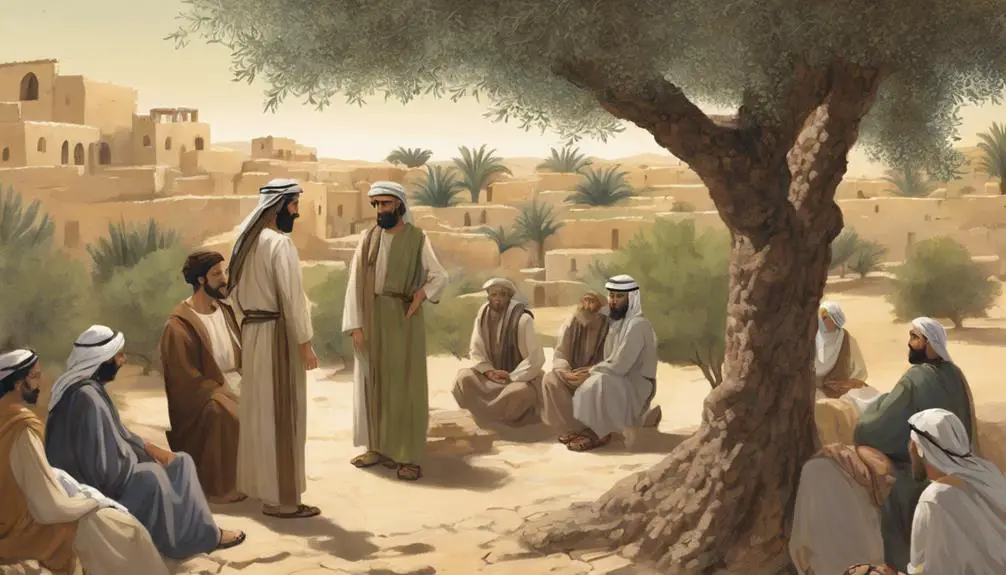Plunge into the biblical depths of 'witness,' where ancient testimony and spiritual transformation beckon a deeper exploration of faith's enduring call.

Witness Meaning in the Bible
Isn't it curious how the term 'witness' permeates both legal jargon and spiritual dialogues? In the Bible, 'witness' carries a weight that transcends its conventional use, inviting you into a deeper exploration of its significance.
From ancient testimonies in the Old Testament to the transformative witness of Jesus and the call for believers to bear witness, the concept is multifaceted.
As you consider how witnessing through actions and words has shaped faith and continues to influence lives, you'll find yourself on the cusp of uncovering layers of meaning that could challenge and enrich your understanding of biblical teachings.
Key Takeaways
- Witnessing in the Bible encompasses legal, cultural, and divine dimensions, grounding truths in community and faith.
- Jesus embodies the ultimate witness, fulfilling prophecies and demonstrating God's power through his life, death, and resurrection.
- Believers are called to be witnesses, sharing the Gospel through actions and words, reflecting Jesus' mission in daily life.
- The act of witnessing, both verbally and through one's lifestyle, plays a critical role in personal growth and community transformation.
Historical Context of Witnessing

Understanding the historical context of witnessing in the Bible reveals the profound evolution of this practice from ancient oral traditions to its pivotal role in spreading religious teachings. Initially, witnessing was deeply interwoven with cultural practices that governed societies during biblical times. You'll find that these practices weren't merely about recounting events or teachings but carried significant legal implications.
In the societies depicted in the Bible, a witness's testimony could determine the outcome of disputes, establish historical truths, and legitimize claims to power or property. This wasn't a role taken lightly; it was a duty imbued with divine significance. The act of witnessing was seen as a sacred obligation, one that required utmost honesty and integrity.
Moreover, the transition from oral to written testimonies marked a critical shift in how religious teachings were disseminated and preserved. This evolution from spoken word to scripture underscores the adaptability and resilience of these cultural practices, ensuring that they remained relevant and authoritative across generations. Through this lens, you can appreciate how witnessing in the Bible transcends its ancient origins, reflecting a complex interplay of legal, cultural, and religious dimensions.
Witnessing in the Old Testament
ARTICLE TITLE: Meaning in the Bible
PREVIOUS SUBTOPIC: 'Historical Context of Witnessing'
CURRENT SUBTOPIC: 'Witnessing in the Old Testament'
Witnessing in the Old Testament encompasses a myriad of narratives that reveal the integral role of testimony in shaping Israelite society and faith. You'll find that legal testimonies and prophetic visions served not only as means for justice but also as vehicles for divine communication. These elements were foundational in guiding the moral and ethical conduct of the community, demonstrating a profound understanding of witnessing as both a responsibility and an act of faithfulness.
Aspect |
Significance |
|---|---|
Legal Testimonies |
Ensured justice and social order, grounding the legal system in truth and integrity. |
Prophetic Visions |
Communicated divine will, offering guidance and correction to the people. |
Community Role |
Fostered a sense of collective responsibility and accountability. |
This table highlights the multifaceted nature of witnessing in the Old Testament, where it was more than just a procedural act; it was a sacred duty that bound the community together and connected them to their divine purpose. Through legal testimonies, individuals were held to a standard of truthfulness, while prophetic visions provided insight and direction, emphasizing the importance of faith and obedience in maintaining societal and spiritual harmony.
Jesus as the Ultimate Witness

Moving from the rich tapestry of witnessing in the Old Testament, we now turn our focus to Jesus, who embodies the ultimate witness in the narrative of the Bible. His life and ministry reflect a divine testimony not only through his words but also through his actions, illuminating the path for humanity in an unparalleled manner. Let's explore how Jesus serves as the quintessential witness:
- Fulfillment of Prophecy: Jesus' life is a testament to prophetic foresight, fulfilling ancient prophecies and demonstrating the reliability and divine origin of biblical predictions.
- Teaching and Miracles: Through his teachings and miracles, Jesus bore witness to the Kingdom of God, offering insights and evidences of divine power and wisdom.
- Sacrificial Death: Jesus' willing sacrifice on the cross serves as the ultimate testimony of God's love and justice, reconciling humanity with the divine.
- Resurrection and Ascension: His resurrection and ascension into heaven seal the divine testimony, affirming Jesus' identity and mission, and providing a foundation for Christian faith.
Through these aspects, Jesus exemplifies the ultimate witness, marking a pivotal moment in the divine narrative and offering profound insights into the nature of God's interaction with humanity.
The Role of Believers as Witnesses
In the narrative of the Bible, believers are called to embody the role of witnesses, a mandate that extends Jesus' mission of divine testimony into the everyday lives of the faithful. You're invited to carry this legacy forward, intertwining your life with the message of the Gospel. This calling isn't merely a suggestion; it's a divine appointment, demanding both courage and humility.
Aspect |
Insights |
Implications |
|---|---|---|
Witness Motivation |
Your faith's depth propels you to share the Gospel. |
A genuine desire to see others experience God's love is crucial. |
Witness Challenges |
You'll face skepticism and indifference. |
Persistence and resilience become your allies. |
Community Impact |
Your testimony can transform communities. |
The ripple effect of your witness can lead to widespread spiritual awakening. |
Personal Growth |
Engaging in witnessing refines your understanding of faith. |
It prompts continuous spiritual development and humility. |
Your role as a witness isn't passive; it's an active engagement with the world, marked by a readiness to share your experience of God's transformative power. Witnessing isn't about perfection in delivery but authenticity in sharing your journey of faith, despite the inherent challenges.
Witnessing Through Actions and Words

Through actions and words, you manifest the essence of your faith, setting a foundation for effective witnessing that transcends mere verbal exchanges. Witnessing, in its profoundest form, encompasses both verbal proclamation and the embodiment of faith principles through one's lifestyle. This dual approach not only communicates the gospel message but also authenticates it through tangible expressions of love, integrity, and compassion. Here are four pivotal elements:
- Silent Testimony: Your life serves as a living sermon. The way you handle adversity, interact with others, and make choices can draw people to Christ without a word being spoken.
- Lifestyle Evangelism: This involves intentionally living out your faith in ways that are observable to others. It's about being a consistent example of Christ's love and grace in everyday situations.
- Verbal Witnessing: While actions lay the groundwork, there comes a time when words are necessary to explain the hope that lies within you. Articulating your faith story can bridge gaps and answer questions that your lifestyle alone cannot.
- Authenticity: The congruence between what you say and what you do reinforces the credibility of your witness. People are more likely to be influenced by what they perceive as genuine and consistent behavior.
Frequently Asked Questions
How Does the Concept of "Witness" in the Bible Compare to Its Legal Definition in Contemporary Court Systems?
You're examining how the role of a witness in court systems today contrasts with another concept, focusing on legal testimony and courtroom procedure.
In modern courts, a witness provides evidence under oath, adhering strictly to legal standards and procedures. This role is pivotal for ensuring justice, governed by rules ensuring reliability and truthfulness.
It's a structured process, quite distinct from broader interpretations, emphasizing factual testimony and the critical role of evidence in judicial decisions.
Are There Any Psychological Effects or Challenges Associated With Being a Witness, as Described in Biblical Narratives?
Ironically, you mightn't expect the emotional rollercoaster that comes with being a witness. Yet, witness psychology delves into the profound psychological effects and challenges individuals face. It's not just about stating what you saw or heard. Emotional resilience becomes crucial as you navigate the pressures and potential trauma.
Analytically speaking, witnessing events, especially of significant magnitude, can deeply impact one's mental health, requiring insight and understanding to navigate successfully.
How Has the Interpretation of Biblical Witness Evolved in Different Christian Denominations Over Time?
You'll find that the interpretation of witness has evolved significantly across Christian denominations over time. This denominational divergence is deeply rooted in historical context, highlighting how varied traditions and theological emphases shape understanding.
Delving into these differences offers a rich, analytical exploration of how core concepts adapt and resonate differently within communities. It's an insightful journey through the layers of belief and practice that define the Christian faith across its spectrum.
What Role Does Witnessing Play in Interfaith Dialogues and Understanding, According to the Bible?
When you delve into the role of witnessing in interfaith dialogues, it's crucial to grasp how it fosters interfaith empathy and upholds dialogue ethics. Through this lens, witnessing isn't just about sharing faith; it's a bridge for understanding and respect across different beliefs.
It encourages you to listen, learn, and empathize, laying a foundation for meaningful exchanges. This approach transforms witnessing from a mere declaration to an insightful, scholarly engagement with diverse faith perspectives.
Can the Act of Witnessing in the Bible Be Connected to Modern Concepts of Social Justice and Advocacy?
You can connect biblical witnessing to modern social justice and advocacy through the lens of ethical witnessing and witness empowerment.
Ethical witnessing involves observing and responding to injustices in a manner that aligns with moral principles.
Witness empowerment, on the other hand, focuses on giving voice to those often marginalized.
This approach not only reflects biblical teachings but also enriches contemporary efforts towards a more just and equitable society.
Conclusion
In the rich tapestry of biblical storytelling, you've seen how witnessing transforms from historical accounts to a spiritual mandate.
You're called to be a beacon, much like a lighthouse guiding ships through treacherous waters, illuminating the truth of Jesus' teachings through your actions and words.
Embrace this role with both reverence and joy, for in doing so, you're not merely recounting events; you're actively participating in the divine narrative, shaping the world with the light of truth.



Sign up